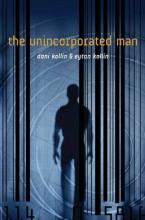inspiration + perspiration = invention :: T. Edison ::

My rating: 4 of 5 stars
This book is a worthy successor to Huxley's Brave New World, which is, in my humble opinion, the best-written of the dystopias. It has all the trappings of a gee-whiz scifi adventure, while packing in plenty of ideas one can ponder for hours.
Short, spoiler-free summary: in the future, the entire human race belongs to a very laissez-faire system of governance where almost anything goes legally, so long as people are free to make their own financial decisions. At birth children are incorporated with so many shares, of which the government and parents take some, and the rest are up to investors to purchase. The goal of every person (both on Earth and its extraterrestrial colonies) is to become a majority shareholder. Also (and, please believe me, all of this information comes out in the first chapter), death is mostly temporary. Science has discovered how to reanimate bodies, provided they are properly preserved.
Our story begins when a man from the early 21st century is discovered in a suspension unit and revived. This dark horse of course becomes a means of explaining the world to the reader, but also upsets that world in ripples that grow to become shockwaves.
Let me be clear that I don't think this book is exceptionally well-written. The writing is good, but stark without finesse. The protagonist borders on being just a little too good to be true at times; while flawed, he almost invariably makes the right call at the right time. I found the first few chapters especially slow.
There are inconsistencies I picked up on here and there that occasionally drew me out of the story. As an example: the pope is referred to being divorced early on, but later a character makes a reference to chaste nuns, leading me to wonder whether only male clergy in the future are allowed to marry. Aside from a few stray references, religion is entirely absent (logical, considering the lack of profit), but then why a pope? It's really the only aspect of this world that is left unexplored. Also, for the first half of the novel the characters (even the "bad guys"), spoke in PG terms, while by the end many characters were using language I didn't think was justified (even given the circumstances), mostly because it felt out of character.
In less capable hands these complaints would have ground the book to a halt and made it a chore to finish. Instead, the authors are to be congratulated for proving that a book about ideas can also be both enjoyable and accessible. With some exceptions, the Kollin brothers really thought through the implications of the world they created, in surprising ways that challenged many of my preconceptions. There's a lot to cover, but they managed to handle infodumps in a way that not only informed the reader but advanced the story.
My fourth star in this review is due to the fact that this seemingly straight-faced book continually challenged my expectations and assumptions. A character I thought would be a stereotypical villain became a fully realized antihero. The protagonist, and by extension I as the reader, was continually challenged to rethink his reactions to the idea of human incorporation, to grudgingly accept his own myopia, and to determine what real freedom actually is. While there were 'splosions and action aplenty, the real climax was a true contest of ideas that occurred between two characters alone in a room having a conversation. By that point I wasn't sure on which side the penny would drop, or even where I wanted it to.
Despite its flaws, the book is an imaginative, intriguing speculation on one potential future, with plenty of implications for our own time.
This review was previously posted at Goodreads and Amazon. I did not receive anything from the publisher or author for this review (but they're free to send me something now if they'd like). The cover was designed by Chad Baker. The book is currently available from Tor Books in Paperback ($16.99), Hardcover ($25.95) and eBook editions ($9.99).





